Zanele Muholi
What does activism in South Africa look like? Is it the angry face of a protester in Tembisa (or De Doorns, Thembelithe or Tzaneen) clashing with police? The balaclava clad shadow who paints incendiary graffiti on city walls in the dead of night? The person in a suit making oral submissions in Parliament, or the placard-holder outside? Middle-class people with a red plastic rhino horn on the grill of their 4×4, or an openly gay woman trying to live a normal life in Khayelitsha?
Democratic South Africa was born out of activism, citizens standing up against a government they found unjust – from small acts of dissent to a life of exile or imprisonment, and sometimes death.
But what does activism mean in 2014?
It is determined mainly by the class interests of the activists and can be divided roughly according to "niches": they include poor communities taking on what they see as an uncaring state, progressive-leaning nongovernmental organisations (NGOs) forcing the state, often in the courts, to provide what the Constitution promises, activists who organise around special interests, and middle-class activists.
There is a broad spectrum, says Right2Know (R2K) spokesperson Mark Weinberg, himself from a family with a long tradition of left-wing activism.
"We're talking about social change, so it's everywhere – interpersonal relationships, families, institutions … There are formal spaces [such as Parliament] but the informal spaces are everywhere."
One of the major challenges is the dominance of the ruling party.
"Formal spaces are treated with the spirit of compliance rather than participation. They ask for submissions … but they are just going through the motions and not taking people's concerns on board."
Although both activism and politics are important, activism has been subsumed by politics, says Janet Jobson, project manager of Activate, a network of young South Africans. "Party politics is about power; activism is about principles. Both are necessary but, unfortunately in South Africa, party politics have overwhelmed the conversation on every issue."
Most activists the Mail & Guardian spoke to have called for more creativity in activism. The most vivid memory of activism in apartheid South Africa is protest: Sharpeville, the Soweto Uprising and the United Democratic Front (UDF) ungovernability campaigns of the 1980s.
"The problem with this is that, post-apartheid, we have adopted protest politics, without the deep level of community organising, political education and navigation of the democratic system that we should have," Jobson says.
Visual artist and lesbian, gay, bisexual, transgender and intersex (LGBTI) activist Zanele Muholi says: "As artists and activists, we have to find alternative methods to make sure that we're heard."
Regarding formal NGO-based activism, "the massive frustration and anger among poor communities have often been demobilised by such movements or [have been] disorganised and focused myopically [on] local issues", says a spokesperson from Tokolos Stencil Collective, an anonymous group of graffiti artists and activists.
"These struggles have often petered out after a few weeks when unable to link up with similar communities.
"Another result of the weakness of broad-based activism in South Africa is that people think the only alternative is to resort to electoral politics."
Activism is often synonymous with service delivery and forcing the state to fulfil its function. Although the shack-dwellers' movement Abahlali baseMjondolo is often cited as an example, it goes way beyond that. "Abahlali is not just about housing and service delivery, but about creating a society wherein dignity becomes the order of the day," its chairperson S'bu Zikode says.
At the other end of the political spectrum, there has been widespread growth in middle-class activism, often based on issues such as crime and violence, but also on issues such language, culture and animal rights.
Such activists are mostly white people who often feel excluded from the political process. But they are criticised for loudly voicing concern about issues such as rhino killings when they were silent when people were suffering under apartheid.
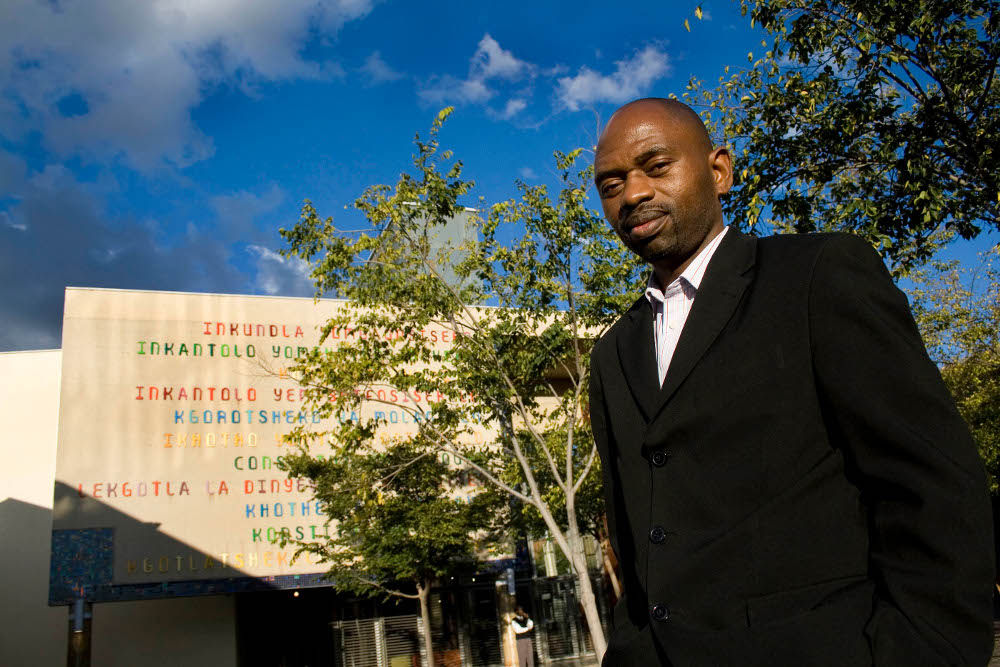
Community activist
S'bu Zikode: Chairperson, former president and founding member of Abahlali baseMjondolo
It was to study law and "not demand houses" that S'bu Zikode left his rural abode in Estcourt for Durban in 1997. With little financial support, he found himself living in a shack in Kennedy Road and his experiences there motivated him to become one of the founding members of the Abahlali baseMjondolo movement, the vision of which is to fight for, promote and advance the interests and dignity of shack dwellers and the poor in general.
Why did you choose this issue?
Personally, as a human being, I believe that we all have a right to live. I grew up as a boy scout and the equality and justice [I learnt about] was what I needed to see, what persuaded me to go into housing activism. I couldn't take seeing homeless people, especially when their houses are bulldozed as if they are not human beings, so I thought I would contribute to finding a solution.
What do you think your impact has been?
Now that the movement has become strong and well known, we can see the change in that shack dwellers are being viewed as ordinary people, who are counted as being part of society – unlike before. They are acknowledged as human beings who have equal opportunities.
We may not have achieved land and housing but we believe respect and dignity for the poor is beginning to emerge. We are also able to contribute at national level towards policy formulation.
What are your frustrations?
Violence and retaliation – we have seen our comrades being assassinated, policemen among them, because they are whistle-blowers, exposing corruption. Corruption has been our greatest threat. We have seen councillors become leaders during the day but hitmen at night, shooting men with guns to protect their corrupt activities and maintain power. It's their turn to eat, that's what they claim.
Who are you trying to speak to, and how do you speak to them?
First of all, we are trying to speak to our members, shack dwellers and the poor, educating them about their fundamental human rights, not only about housing but also about the Constitution of the republic.
Also, because we believe we are a democracy from below, we are trying to tell the government how we want to be governed. And then to society as a whole, because Abahlali is not just about housing and service delivery but about creating a society wherein dignity becomes the order of the day.
What is your weapon of choice – spray can, pen, petrol bomb?
Our weapon of choice is the Constitution. The rule of law is our weapon – we believe we should use the law effectively on our side. That's why the only choice now of the state is to kill us. We have successfully sought interdicts against the evictions of shack settlements, which the municipalities won't even respect.
Where does your funding come from?
It comes from our members and also from local churches, as some of the prominent bishops support our cause. We also have support from other nongovernmental organisations, locally and internationally. Support is not always in monetary form: it could also be something like pro bono legal representation.
What do you think about the state of activism?
There is a lot of room for improvement. In most cases, outspoken activists are co-opted, they are offered high posts in the government or in the private sector. This compromises them. – Fatima Asmal
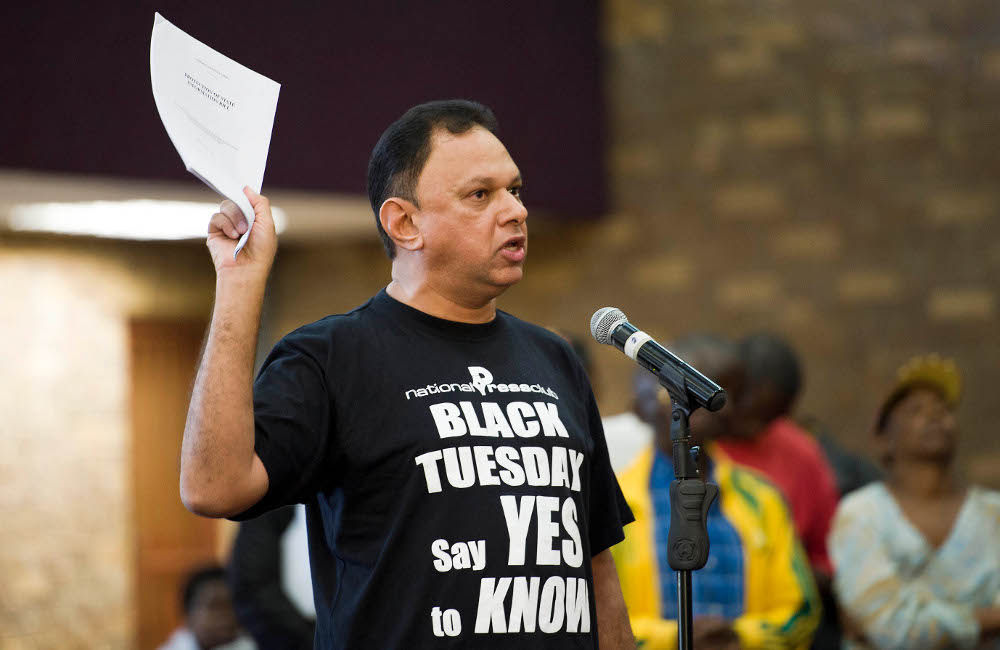
The middle-class activist
Yusuf Abramjee: Head of Crime Line, Lead SA founder member
Abramjee is the head of news and current affairs at Primedia Broadcasting and is also the head of communications for the Primedia Group. He started his career in broadcasting as a crime reporter for Talk Radio 702.
Why did you choose this issue?
My work on Crime Line came from years of covering crime stories and the police as a journalist for Talk Radio 702. As a reporter, I saw first-hand the extent of the crime problems in our communities, and saw the impact that this was having on my fellow South Africans. When the Crime Line concept was first tested, it was intended as a short-term campaign to get information about drugs from citizens. But the station was so overwhelmed by the response we received that we decided to turn it into a permanent campaign.
My work for Lead SA has grown quite organically since we adopted Lead SA in August 2010. As a media company, we wanted to use our resources and available platforms to make a positive difference. Lead SA is a call on all of us to stand up and be active citizens in our communities.
What do you think your impact has been?
The most important impact of Crime Line has been its role of empowering ordinary members of society to blow the whistle on crime without revealing their identity. Crime Line is a safe and effective alternative to provide tip-offs and ultimately get criminals behind bars.
The proof is in the pudding, so to speak, with thousands of arrests and millions of rands in stolen goods [recovered]. Within two years, a TNS survey showed, Lead SA reached 2.5-million people in Gauteng, Cape Town and Durban.
When we set out in 2010, we wanted to make a positive difference and the way people have taken up the call to Lead SA has been inspiring and phenomenal. Initiatives such as the Bill of Responsibilities, included in the life-orientation curriculum, is a sustainable effort to instil in pupils the knowledge of their rights and the responsibilities they have.
What are your frustrations?
It can sometimes be frustrating to work with authorities on a project, and to have endless meetings and work sessions, but with no action.
Our background is radio, so we are used to moving quickly and responding immediately, so it can be frustrating working with organisations that do not work at the same pace.
Lead SA has a few detractors, who see it as a marketing ploy, or accuse our campaigns of being toothless. It is frustrating to spend so much time, money and human effort to spread a broad message of activism [only] to be criticised by a few who disagree with a specific campaign.
Who are you trying to speak to, and how do you speak to them?
We are trying to speak to the nation. Our messages are targeted at everyone living in South Africa, and we are always looking for new ways to reach audiences we haven't reached before.
With Crime Line, we are lucky to have a number of Primedia Group companies who often help us to spread the message through their media platforms, such as billboards, taxis and in-store. We are also lucky to have the SAPS partnership, which sees our messaging included in their communication.
What is your weapon of choice – spray can, pen or petrol bomb?
The pen.
Where does your funding come from?
Crime Line has, until recently, received all its funding from the Primedia Foundation. However, Crime Line has now been registered as a trust, so we will be able to do fundraising and receive sponsorship from other companies and apply it effectively in the fight against crime.
Lead SA is fiercely noncommercial, so it receives no financial support from corporates or donations. It is run by Primedia Broadcasting and Independent Newspapers.
What do you think about the state of activism?
Through Lead SA, we can attest to a definite desire among South Africans to be active citizens, and I think there is a corresponding wave of action, but the challenge is to sustain interest and ensure the activism has impact. – Sarah Wild
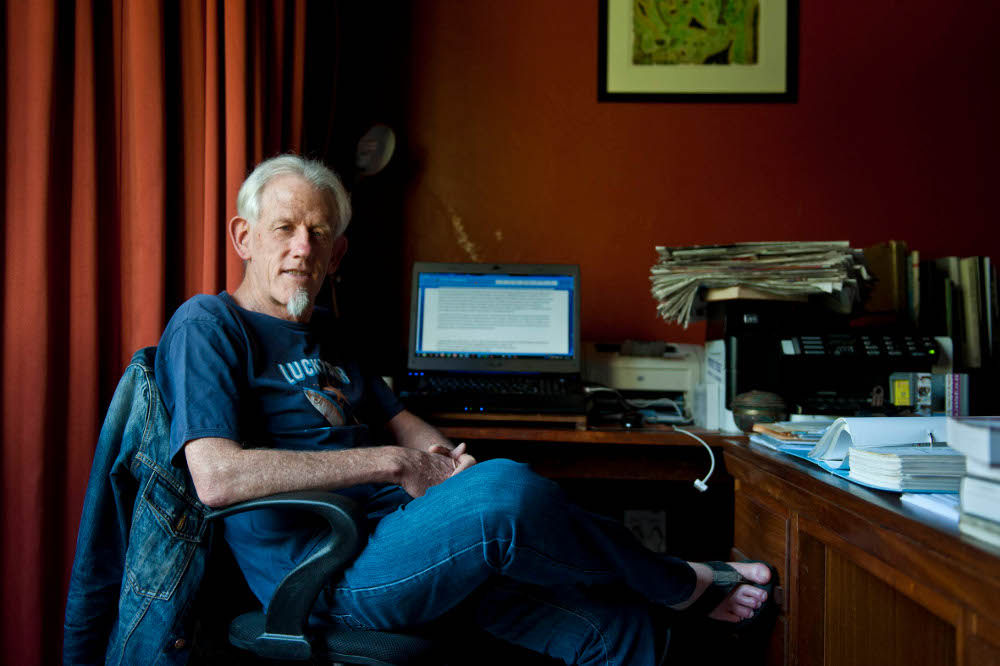
The professional activist
Maurice Smithers: Yeoville Bellevue Community Development Initiative
Former UDF stalwart and ANC activist Maurice Smithers became politically involved as a student in the 1970s in the week before the expulsion from Turfloop University of the Black Consciousness student leader Onkgopotse Tiro.
"Tiro had just climbed into Bantu education and had been expelled," Smithers recalls.
Subsequent protests by students at other universities were met by tough police action, culminating in Smithers going on trial for riotous assembly.
Today, as the development co-ordinator of the Yeoville Bellevue Community Development Initiative in Johannesburg, Smithers has joined people working at "a local level fighting for delivery".
Why did you choose this issue?
In a sense, it is by default; but wherever I would have lived, I would be doing it. If I had chosen to live in a suburb that is still like it was before, like Parkview, for instance, which is where my wife and children lived, I might have gotten involved in a CPF [community police forum] or perhaps a residents' association or focused on something else outside of that area. Being involved with the Yeoville community is full-time work.
How do you measure your impact?
I try not to think about that too much because I would get depressed. I tend to be a lot harsher on myself than most people would be.
You could argue we haven't made too much progress but, with little things such as getting the library, which the Johannesburg Development Agency (JDA) built in 2002, it has had a significant impact on young scholars and students because they have a place to go and study and read. The JDA also fixed the Yeoville swimming pool, which had a leak. That has had a lot of impact on young people.
Who are you trying to speak to and how do you speak to them?
With the newspaper we used to run, people knew what was happening in the community and could act on things that were happening in it. For example, liquor-licence applications … people didn't know that they could object to new applications and so on. So we continue to use the internet.
But I think our greatest success has been keeping Yeoville on the map, be it to the city, to government authorities and to the community.
An interesting thing that recently happened is that Wits's [University of the Witwatersrand's] architecture and urban-planning department came here for two years in 2010 and 2011. Students did their theses on Yeoville before moving on to Turffontein and Rosettenville. One of the things they have found was that there was very little in the way of community organisations in Rosettenville and Turffontein.
Activism, which is not prevalent in other parts of the city, we have put on the agenda.
What are your frustrations?
It is that we are trying to develop a constructive relationship with the City of Jo'burg but there is political interference and it is hard to organise people in an environment where people are struggling to survive.
Back then, people were still trying to survive but, in the apartheid period, it was easy for people to understand the struggle. It was black and white, and I don't mean this in a racial sense.
It was very tangible to grasp and understand, and internationally that was the case. The UDF had a lot of international support, a lot of funding came from international networks, so in that way it was easier to be an activist in the apartheid period.
Now it's harder to get people to commit themselves.
A lot more people are using community organisations, whether be it CPFs, ward committees or their ANC branch for their own purposes. It's understandable, because getting rid of apartheid didn't make people's lives better.
What is your weapon of choice?
It's media and communication.
I think a lot of challenges we have in our area are the direct outcome of abysmal communication, especially from the government, which was why we established a newspaper.
The government doesn't communicate enough, especially in an area like this when you have migrants coming from all over South Africa and Africa. Nobody communicates their rights and responsibilities to them and what it means to live in Johannesburg.
This extends to schools where people need civic education about what it means to live in a society.
Where does your funding come from?
Initially, our funding came from the Johannesburg Development Agency then the Development Bank of Southern Africa, but then we encountered a challenge in that there are no funds around at this time. That might change because we are looking at foreign funders who are funding community-based urban development.
What do you think about the state of activism?
My role has moved from an apartheid activist to a post-apartheid one. In the Seventies and Eighties, particularly in the white community, our focus was national politics, trying to be part of regime change. In the post-apartheid era, the activism is more about community issues.
In the apartheid era, white communities were well catered for. There wasn't much you needed to bother about – that was the nature of apartheid. In black, coloured and Indian areas, people were involved in community as well as national politics. Now, we are homing in on what's happening in a local area. – Kwanele Sosibo
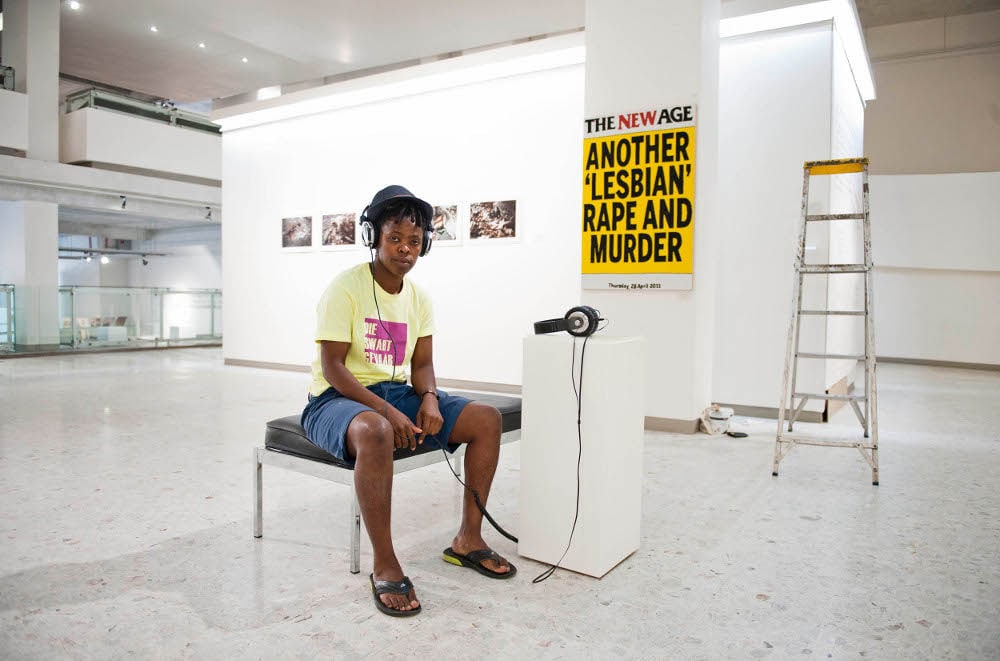
LGBTI rights activist
Zanele Muholi: Visual artist
When Muholi won the Freedom of Expression Index Award last year, she trumped an impressive group of nominees, who included the Russian punk group Pussy Riot, filmmaker Haifaa al-Mansour and cartoonist Aseem Trivedi. She dedicated the award to two friends who suffered hate crimes and complications from HIV.
"I am a visual activist so, whatever I produce, I produce it to achieve a political agenda," she says.
Her multimedia exhibition, Mo(u)rning, is on at the Wits Art Museum until the end of March. "If other people shy away or are turned off by the images then so be it, but I can't do anything except to continue that fight."
Why did you choose this issue?
It was out of the frustration of not seeing myself in the mainstream media, not seeing our images as the LGBTI community. Between 1990 and 1994 there were so many changes happening in South Africa. There were constitutional changes, there was a regime change, but where were the images? So one had to produce those images, which spoke of the change, for South Africa's history archives.
What do you think your impact has been?
That will be decided by others reading and looking. It's the audience that can see the impact. We as activists are just trying to reclaim what is ours.
As for photographers who are using the medium to bring social change, there are very few of us, especially black women. So the impact can only be measured by the beneficiaries of our work and those who can't speak out for themselves.
What are your frustrations?
A lack of resources and a lack of access to spaces. A lot of people want to become film producers and photographers but, out of 100, not many would ever get to hold an exhibition or travel widely and see that they can survive out of projects or win big prizes. How many people are ever published? There are many people with projects in mind, with concepts but the execution becomes a problem because of financial resources.
Also in post-apartheid South Africa, so many spaces are not explored. There are so many remote areas, like Marikana, which we only heard of because there was a tragedy.
Who are you trying to speak to, and how do you speak to them?
It's the whole world, but the language of resistance is always consistent with my message. It's a clear visual language, and that's maybe how people will remember me – as a black lesbian who took photos of gay people, pushing an agenda and penetrating impossible spaces.
What is your weapon of choice?
I use mixed media – from sound installations to sculpture, photography and videos. I'm trained as a photographer but that's not all that I use.
Where does your funding come from?
Well, I can't write proposals and I can't beg and give up my soul. All I know what to do is to work and then hope that my work will be used. So I give lectures at universities, I participate in shows where they need a queer element.
There are lots of ways to work but, as photographers, we haven't gathered to speak about ways of making a living. I participated in the Venice Biennale and earned an artist's fee. I have done about 10 exhibitions in the past year and earned artist fees. There's also some editorial work. I also work with NGOs, where people need to collaborate with me, so it affords me a chance to work with different artists.
What do you think about the state of activism?
I can't generalise but I can focus on my own community, my immediate space. Hate crimes affect not only me but all of us in one way or another. We are all involved whether we are gay or not. As artists and activists, we have to find alternative methods to make sure that we're heard because there are a lot of lives lost along the way. – Kwanele Sosibo
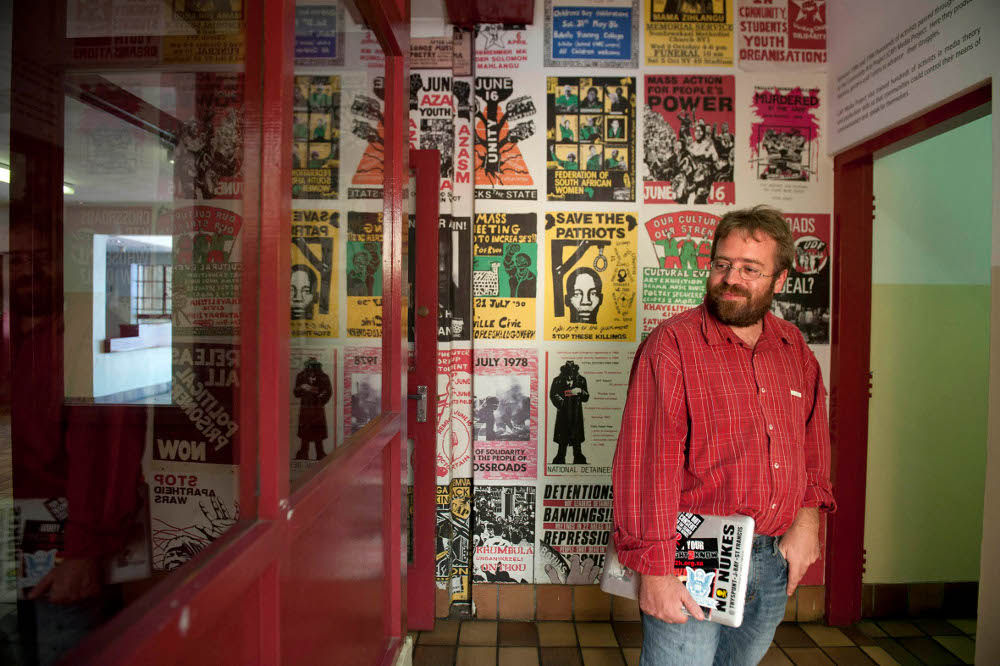
Nongovernmental organisation activist
Mark Weinberg: Right2Know campaigner
The R2K was formed in late August 2010 in opposition to the secrecy [Protection of State Information] Bill, developing into a mass-based coalition, co-ordinated through democratic working groups in Gauteng, KwaZulu-Natal and the Western Cape. The campaign has expanded in scope to include access to information, media freedom and diversity, telecommunications and protection of whistle-blowers.
Why did you choose this issue?
Freedom of expression, the ability to access information and dialogue to make informed decisions are the foundations of any participatory democracy. History is littered with examples of paternalistic, elitist and essentially authoritarian societies that have failed the people on both the left and the right. The right to know is fundamental to any democracy that is responsive and able to deliver the social, economic and environmental justice we need. It is essential for a society in which we all live free from want, in equality and in dignity. I have worked to enable a dialogue for social justice since my days in the South African Students' Press Union.
What do you think R2K's impact has been?
The R2K has succeeded in delaying the passing of the secrecy Bill for over two years and has ensured that some important amendments have been introduced.
We have facilitated solidarity campaigns for access to information, defended media freedom and campaigned in support of public and community broadcasting.
We have made access to tele-communications and the cost of communication a social justice and human rights issue. Most importantly, we have built a democratic movement that unites organisations and activists in action to defend and advance our hard-won democratic freedoms.
What are your frustrations?
Perhaps the lowest moments have been going to Parliament and watching former comrades and heroes of the liberation struggle dressed in power suits, bowing to the minister of state security and voting to pass the secrecy Bill. For those brief moments one is filled with disgust and despair.
Who are you trying to speak to, and how do you speak to them?
The R2K is in almost everybody's interests. The struggle for freedom of expression and access to information cuts across the traditional South African divides of race, class, gender and geography, so the campaign aims to unite and mobilise all freedom-loving people. Only active and organised citizens can hold undemocratic power in check.
What is your weapon of choice – spray can, pen, petrol bomb?
The post-apartheid state has attempted to divide citizens into "civil" and "uncivil" society.
On the one hand [are] those who work in formal institutions and adopt a posture of supporting the government to improve legislation or service delivery, on the other hand [are] those who adopt a more confrontational approach to the injustices of the state and tend to express themselves in the public domain outside of formal institutions and processes.
The R2K rejects this attempt to legitimise and delegitimise different forms of expression and engagement. We engage tactically on every terrain, from protest to press statement and policy submissions. If we think the government is doing well – for example, their drive to bring down the cost of communication – we say so. If we think they are messing up, we don't waste much time with diplomacy.
We spend most of our time holding local meetings and distributing popular education material to ensure the campaign is rooted in working-class communities.
Where does your funding come from?
We are funded by donations from the public and a number of international human rights and solidarity organisations. We publish a list of donors on our website.
What do you think about the state of activism?
It has been a challenging period since the early 1990s when the ANC began demobilising the people and promoting the neoliberal dogma that citizens are consumers who should wait patiently for services and compete individually for opportunities in a growing economy.
After almost 20 years of jobless growth and under-investment and commodification of basic services, we see that social cohesion has been pushed to its limits and people have begun to organise again.
The stand taken by the striking workers of Marikana in 2012 was a tipping point. Numsa's [National Union of Metalworkers of South Africa's] recent split with the ANC is another.
The rapid growth of the R2K campaign is one expression of this new wave of organising for social justice. – Glynnis Underhill
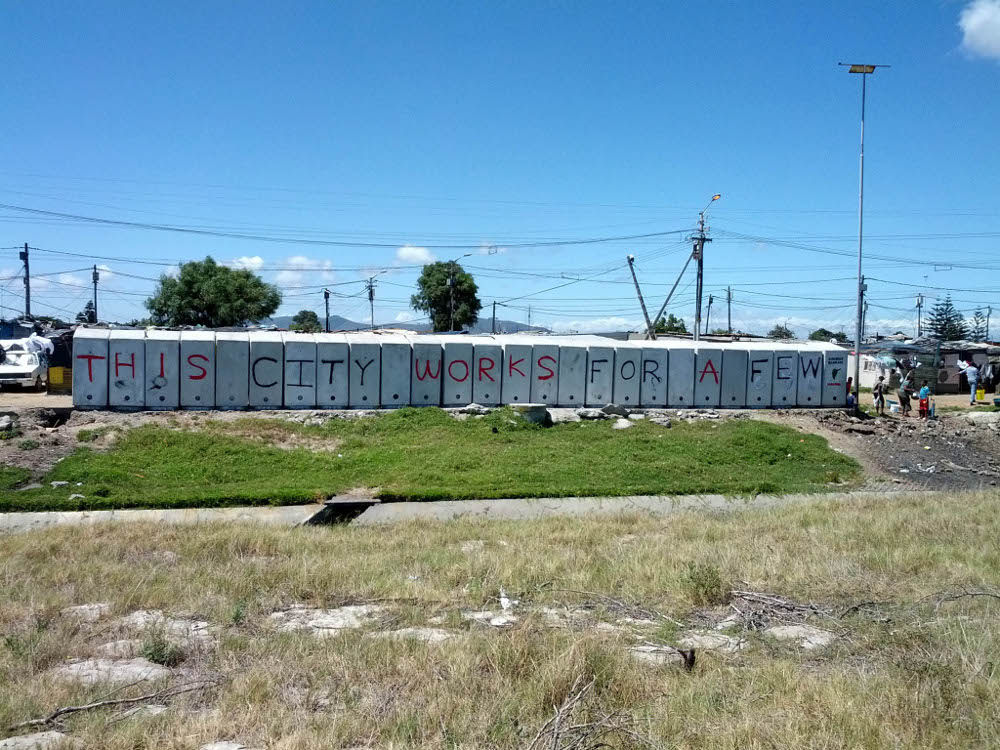
The out-there activists
Tokolos Stencil Collective: Visual activists
An anonymous group of stencil and graffiti artists, activists and other concerned citizens from all different social classes, the Tokolos Stencil Collective states on its Facebook page: "Like the tokoloshe which, though invisible, finds a way to scare the shit out of children throughout the country, our noble aim is to terrorise the South African elite: those who screw us with forced removals, privatisation, gentrification and, of course, the many Marikanas that plague our society each and every day."
Why did you choose this way of protest?
Despite its failures, the ANC, through aggressive political marketing, has successfully branded itself as the organisation that single-handedly rescued South Africa from racist totalitarianism. Little credit is given to the trade unions and rank-and-file workers, to the PAC [Pan Africanist Congress] and Azapo, to unaffiliated protesters and other anti-state grassroots organisations that fought state repression during apartheid.
The Democratic Alliance, which emerged from the old Progressive Party, which collaborated with the structure of the regime, has also been able to rebrand itself despite its own institutionalised racism and commitment to anti-poor and anti-worker legislation.
The misleading rhetoric of these and other political parties, which are all committed to working through an elite-dominated political system, has helped to sustain political and economic hegemony over the people.
We, a collection of anonymous artists, activists and other concerned citizens, have introduced the Tokolos Stencil Collective as a counternarrative to the powers that be. We believe the Marikana incident, in particular, was a turning point in the dominant narrative of South African liberation and could be useful in creating awareness around the increasing inequality, human misery and class antagonisms since 1994.
Through our work in solidarity with other grassroots activists … our goal is for the oppressed to take active ownership of the narrative of their continued oppression, land dispossession and their everyday struggles for freedom. We therefore seek to use public space to disrupt existing narratives and build opportunities for alternative dialogue around these issues.
What do you think your impact has been?
We are new and so our impact has been limited.
However, so far, we have begun to bring the Marikana massacre back into public discourse in Cape Town. We have also reminded people that government propaganda needs be interrogated and not taken at face value. This is, for instance, why our "This City Works For A Few" stencil is starting to be noticed.
We are also looking to speak to issues such as segregation and land dispossession. New stencils will also address women's rights to access public spaces and provide disruptive counternarratives to the dominance of heterosexism and homophobia.
It is hard to estimate just how far the reach of our political art has been. We estimate that at least 200 000 people view our work that have been placed at strategic points along the N2 freeway each week. Many more take note of our art at train stations, on main roads and in township communities all over the Cape Town metropole.
What are your frustrations?
It is extremely frustrating when our spray cans finish halfway through a stencil or when the spray cap gets clogged.
It is even more frustrating that the City of Cape Town spends millions of rands removing some of the most beautiful and inspiring street art. They waste all this money to make our city dull and boring even though they allow corporations to spend billions infecting our public space with their consumerist propaganda.
Who are you trying to speak to, and how do you speak to them?
Our target is any South African who is genuinely concerned with the wellbeing of our beloved country.
In almost any other constitutional democracy based on the respect of human rights, the massacre of 34 citizens by the state would have led to, at very least, the resignation of the government, but also likely to a popular revolt of the people. Unfortunately, this was not the case with Marikana.
Our work is a necessary way to create awareness around the right to life and its absolutism in order to prevent South Africa spiralling into a totalitarian police state.
What is your weapon of choice?
We reserve the right to use many weapons in our struggle for dignity and freedom and against oppression. Our main tools at the moment are the spray can, plastic boards stolen from political campaign posters, which we rework into stencils, the odd balaclava and social networking websites such as Tumblr. See Tokolosstencils.tumblr.com.
Where does your funding come from?
We believe the M&G, like other corporate media, should be more open to how sponsorships and advertising influence the editorial process.
Likewise, we believe it is very important that these kinds of questions are put to political parties. It is clear that all major political parties in this country are beholden to their elite funders.
But to answer your question more directly, our funding comes from our own sweat and hard work. The project is collectively run by volunteers and self-funded by its members. Our nonexistent funding is both our biggest constraint and our greatest asset.
What do you think about the state of activism?
A few activist-oriented NGOs have a near monopoly on more formal and organised forms of activism. It includes more progressive NGOs such as the Social Justice Coalition, the TAC [Treatment Action Campaign] and the Development Action Group. These organisations undermine independent social movements by co-opting their members with food, T-shirts and even jobs.
In Cape Town, this has been difficult for community activists to resist. In Durban, Abahlali baseMjondolo has been more successful at maintaining its independence.
Nevertheless, many progressive movements have focused on isolated issues, and often do not address other forms of oppression such as sexism and homophobia.
Another result of the weakness of broad-based activism in South Africa is that people think that the only alternative is to resort to electoral politics. The rise of the EFF [Economic Freedom Fighters] should also be seen in this light. Although the EFF has many progressive aspects to its policy platform, its rise and co-option of the energy of community struggles has and will have a negative effect on these struggles. Once the EFF gets into Parliament, its policies will be watered down and its leaders soon co-opted by capital.
In order to have a long-term impact on South Africa, activism must maintain its autonomy from NGOs and political parties seeking to control it. – Glynnis Underhill
The education activist
Ntuthuzo Ndzomo: Equal Education
Ntuthuzo Ndzomo grew up in Cape Town's Khayelitsha township and, like so many other South Africans who attended a township or rural school, he received an education inadequate in quality. He knew he and his peers deserved better so he became a member of nongovernmental organisation Equal Education. After school he decided to study towards a BA majoring in history and politics at UCT as doing so he would be able to do his job, and his work in broader civil society, better.
Why did you choose this area?
I could very easily relate to what Equal Education was campaigning for, like poor infrastructure in schools and teachers who aren't properly trained. I know what it feels like to go to a public library and wait three hours to use a computer and sometimes have to go home without using one. When I asked questions in high school I didn't get answers if it wasn't in the textbooks. Why didn’t we have textbooks? I used to ask myself. When I left school, I realised my younger cousins, and other children I knew would still have to face these problems for years to come. I thought: "It needs to be us who changes this."
What do you think your impact has been?
I joined Equal Education as an equaliser (a pupil activist) in 2008 and later became one of its leaders. I can say that most of what I have done is prove what the statistics have already said – that South Africa's education system is messed up. I've helped the movement by educating pupils about their rights and taking photos of schools. I've spoken to people about what it’s like to learn at theses schools and I've told their stories.
What are your frustrations?
Most of the time my frustration is with government. It sees us as an enemy and anti-government but we're not. We're saying these are the problems, these are the solutions, let's work together on this.
Who are you trying to speak to, how do you speak to them?
We campaign in a democratic and reasonable way and we use what was given to us in the Constitution. We never go beyond that. The Constitution says we have the freedom to protest nonviolently. We have the freedom to speak out about our dissatisfactions. We have the freedom to gather. We have the right to join social movements. We educate pupils, parents, citizens, and schools about their rights. We make them aware that the bad situation in schools shouldn't be seen the norm. It should be changed. We use the media to tell South Africa about our campaigns. South Africa's constitution allows us to do this.
What is your weapon of choice, spray can, pen, petrol bomb?
We use the pen, figures, facts and mobilisation. We have strength in numbers.
Where does your funding come from?
International and local donors, like Atlantic Philanthropies and Open Society Foundations. You can see them on our website and in our annual reports.
What do you think about the state of activism in South Africa?
Young people need to be more involved. They're angry and tired of inequality. Their involvement is important for us to move forward. Actually, it's not even anger, it's just that people are tired. We might have figures and statistics but their reality is the most powerful encourager to get involved.